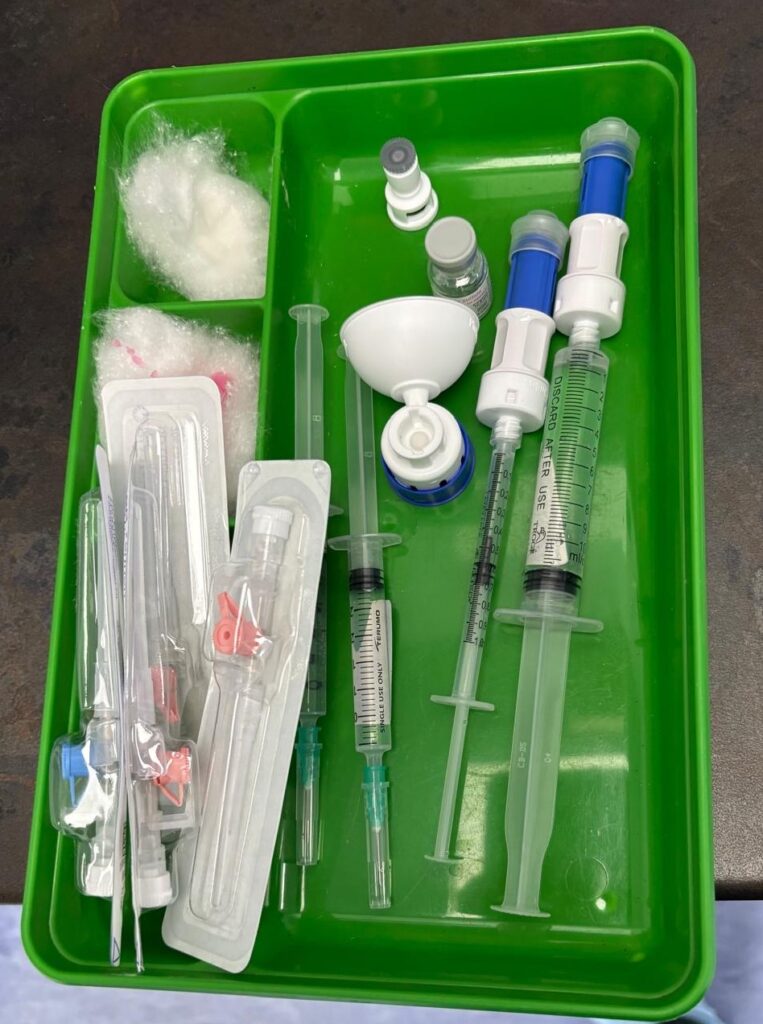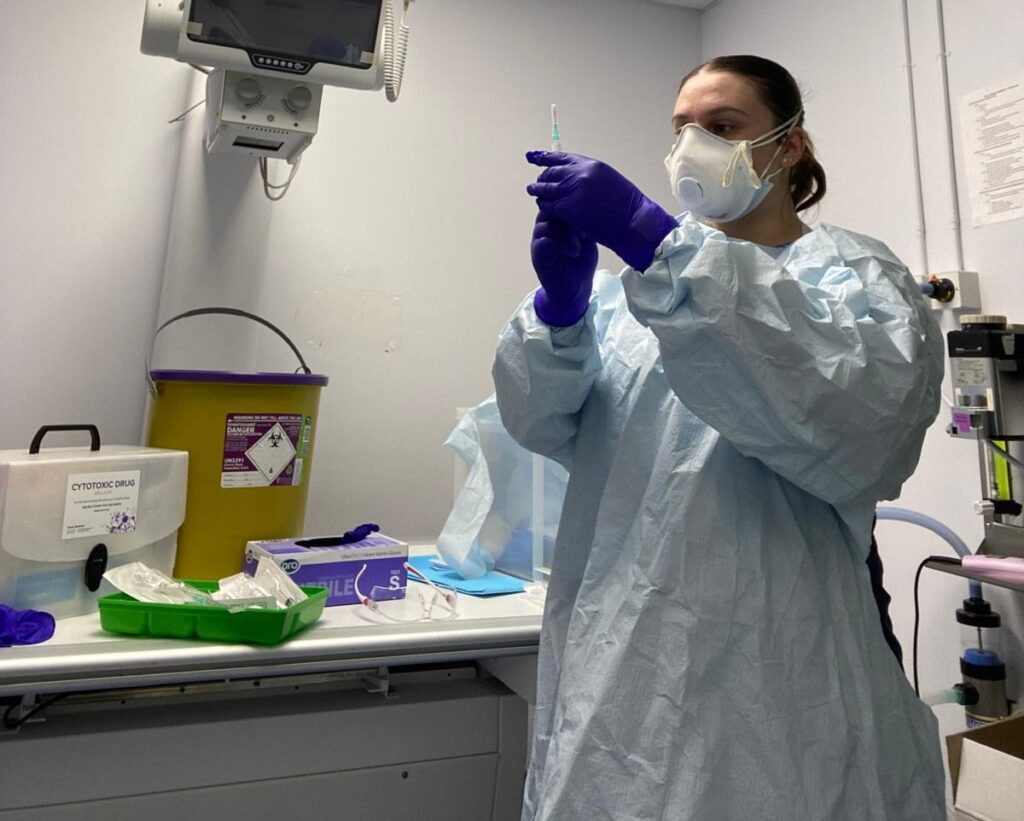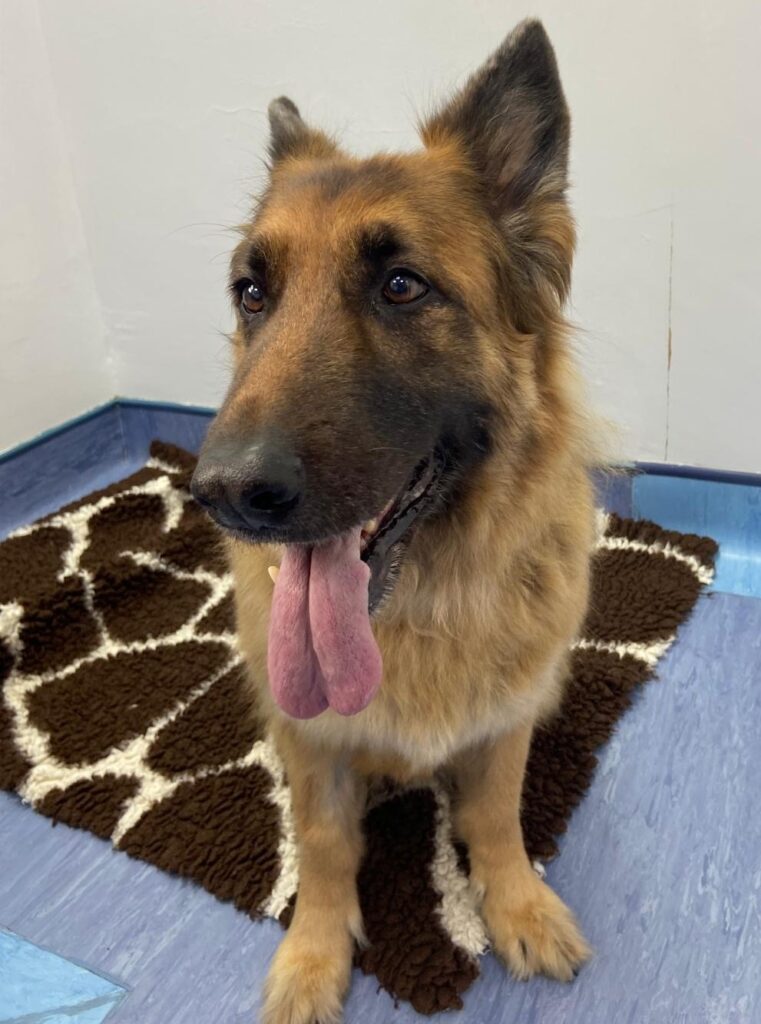Meet Maisie, our brave pet for April!
Maisie is an 9 year old German Shepherd dog who has become a regular visitor to Hollybank Vets as she has been treated with chemotherapy for small intestinal lymphoma.
Maisie first became unwell in September 2024 and she came to see us as she had not been herself for a few days. She had vomiting and diarrhoea and had lost weight.
On examination her heart rate was high and the vet palpated some fluid in her abdomen. This was confirmed by an ultrasound scan and a sample was taken to try and determine the nature of the fluid. Fluid in the abdominal cavity, also known as ascites, is never a normal finding and can be caused by several disease processes including heart failure, low protein levels and infection. Looking at the fluid and analysing the types of cells and levels of protein present can help to find a cause for the ascites. It is also important to ascertain that the fluid is not blood as this would indicate an emergency.
In Maisie’s case it was determined that the fluid was septic – with bacteria and lots of white blood cells present, suggesting an infectious process and causing a septic peritonitis. At this point we were concerned that Maisie may have a rupture of her gastrointestinal (GI) tract which had led to contamination of the abdominal cavity. Most commonly this can happen if there is a foreign body i.e. bone which has perforated the intestinal wall.
Maisie went to surgery and had an exploratory laparotomy, during this procedure we examine all the abdominal organs to check for abnormalities and try to find the cause of the symptoms and findings so far.
Maisie had pus in her abdomen along with the fluid that had been sampled. There were two areas of her small intestine which had been perforated but no foreign body or tumour was seen to have caused this. The affected area of the small intestine was resected as it was too fragile to be repaired, and her abdomen was flushed with plenty of saline to remove any remaining contaminants.
Maisie stayed in hospital for 3 days as she recovered from the surgery and was on fluids, pain relief, antibiotics, anti-nausea medication and gut motility stimulants. Maisie was in a critical condition and was requiring lots of care from our vets and nurses.
The resected intestine was sent to the lab for analysis to find a cause for the perforation. Results showed that she had small intestinal lymphoma. The lymphoma has caused the intestinal tissue to become necrotic and affected the integrity of the wall, leading to the perforation. This then allowed intestinal contents to leak through, along with the bacteria found in the GI tract, causing the septic peritonitis.

Lymphoma is a cancer affecting the lymphocyte (a white blood cell) and lymphoid tissue, which is found all over the body in lymph nodes, the spleen, bone marrow and the GI tract. Lymphoma is a systemic disease and as such, cannot be cured with surgery like other tumours can be. The gold standard treatment for lymphoma is chemotherapy, with the ‘CHOP’ protocol being what was recommended for Maisie. This uses multiple different chemotherapy agents altered each week for around 19-25 weeks to try and achieve remission in the canine patient.
It is not always possible to achieve remission so the main aim of chemotherapy in our veterinary patients is to maintain or improve their quality of life. We would not want your pet to be suffering more from the treatment of the cancer than from the cancer itself. If we are extending your pets life, then we want that extra time to be of good quality and we want side effects to be minimal.
Side effects after chemotherapy are less common than in humans but we may see vomiting, diarrhoea or lack of appetite. We can give other medications to help manage these symptoms and we will usually give anti-nausea medications pre-emptively to prevent your pet from feeling sick. Lymphoma can make dogs very unwell and often a single dose of chemotherapy will make them feel a lot better and alleviate most of their symptoms related to the lymphoma, rather than making them more poorly from the chemotherapy drugs which some owners may be concerned about.

Maisie had blood tests before each chemotherapy dose to check for side of effects of the drugs. Maisie responded well to her chemotherapy with minimal side effects. Her chemo had to be delayed on two separate occasions as she had low white blood cells, but the following week these had returned to normal. Maisie also had some diarrhoea at times, but this was easily managed with probiotics and may have been caused by her eating something that she shouldn’t!
Maisie’s owners have been so dedicated to her care and we asked them about their experience with her diagnosis and treatment.
“In September 2024, Maisie was diagnosed and we needed to decide if we went ahead with treatment or not. Whilst we only had what felt like a short time to decide, on seeing how well she recovered from the operation we assessed our options and decided we could afford to cover her full treatment if necessary. During the first month, she perked up a lot and started eating much better than she had before. Our insurance paid for the operation and much of the first four treatment months. As each set of treatments completes Maisie is behaving as if she is younger than she actually is. She has resumed behaviours from her younger years as well as regaining her strength and pulling power.”
Maisie has now completed 5 cycles of her chemotherapy which has taken around 30 weeks. She had an extra cycle as her type of lymphoma was so aggressive, and because she was tolerating the treatment so well! Maisie has stopped coming for her chemotherapy, she is currently doing very well and enjoying exploring the outdoors with her brother, Alphie!



